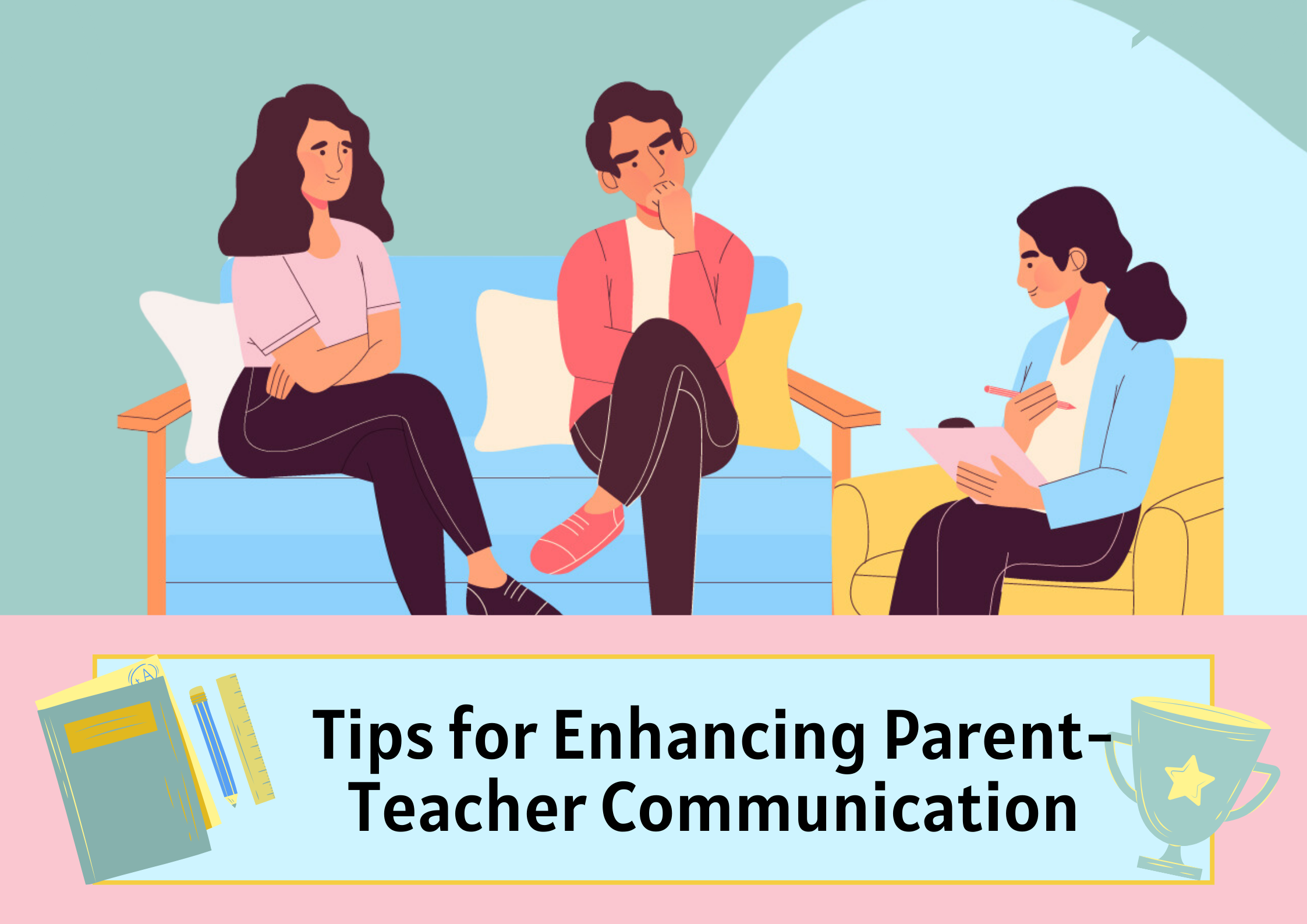Parental guidance plays a pivotal role in a child’s educational journey. The partnership between parents and teachers is crucial for fostering a supportive learning environment. When parents actively engage in their child’s education, it positively influences academic performance, behavior, and overall well-being.
Education is not solely teachers’ responsibility but a collaborative effort that involves parents, educators, and students working together. By understanding the significance of parental guidance, parents can contribute effectively to their child’s educational success and work together with effective parent-teacher communication.
Role of Effective Communication Between Parents and Teachers
Effective parent-teacher communication forms the foundation of a successful parent-teacher partnership. Clear and open lines of parent-teacher communication ensure that parents stay informed about their child’s progress, challenges, and achievements. It allows teachers to share insights, address concerns, and collaborate with parents to create a supportive learning environment.
As we delve into enhancing parent-teacher communication, we must recognize the unique perspectives of both parents and teachers. Understanding each other’s roles, challenges, and expectations can establish a more productive and positive collaboration.
Understanding the Teacher’s Perspective
Recognizing the Challenges Faced by Teachers
Teachers encounter many challenges in the classroom, from managing diverse learning styles to addressing behavioral issues.
Recognizing these challenges helps parents empathize with educators and work collaboratively to find solutions. By acknowledging the complexities of teaching, parents can better appreciate the efforts and dedication that teachers bring to their child’s education by enhancing parent-teacher communication.
Appreciating the Teacher’s Role in a Child’s Education
Teachers serve as mentors, educators, and role models for students. They play a critical role in shaping a child’s academic and personal development.
By appreciating the teacher’s role, parents can cultivate a positive relationship beyond academics. A strong parent-teacher partnership contributes to a supportive learning environment where students thrive academically and socially.
Establishing a Collaborative Mindset
Parents should approach the relationship with teachers with a collaborative mindset to enhance communication. Recognizing that both parties share a common goal—ensuring the child’s success—sets the foundation for effective collaboration. Open-mindedness, flexibility, and a willingness to work together contribute to a positive and productive parent-teacher partnership with effective Parent-Teacher Communication.
Establishing a Positive Relationship
Attending Parent-Teacher Conferences
Importance of Regular Attendance
Parent-teacher conferences offer a valuable opportunity to connect with teachers and gain insights into a child’s academic progress. Regular attendance demonstrates a commitment to a child’s education and allows parents to stay informed about their child’s strengths, areas for improvement, and overall well-being.
Preparing for Conferences with Specific Questions
To make the most of parent-teacher conferences, parents should come prepared with specific questions about their child’s academic performance, social interactions, and any concerns they may have.
This proactive approach fosters meaningful discussions and ensures that parents leave conferences with a comprehensive understanding of their child’s educational journey.
Open House Events and School Activities
Participating in School Events
Beyond formal conferences, parents can engage with teachers by participating in open house events and other school activities. These events provide opportunities to meet teachers in a more relaxed setting, fostering a sense of community and collaboration. Active involvement in school activities also demonstrates a commitment to supporting the overall school community.
Building Connections with Teachers Outside Formal Settings
Connecting with teachers outside formal settings, such as parent-teacher conferences, creates a more personalized relationship. Casual interactions, whether through school events or brief conversations, contribute to building rapport and trust between parents and teachers.
Utilizing Communication Channels
Email Communication
Writing Effective and Concise Emails
Email is a commonly used communication tool between parents and teachers. When composing emails, it’s essential to be clear, concise, and respectful of the teacher’s time. Clearly stating the purpose of the email, whether it’s to address a concern, seek clarification, or share information, ensures that communication is effective and efficient.
Setting Expectations for Response Time
To facilitate smooth communication, it’s helpful to establish expectations for response times. While teachers have busy schedules, knowing when to anticipate a response enables parents to plan accordingly. Open communication about response times fosters understanding and helps maintain a positive and respectful dialogue.
Communication Apps and Platforms for Parent-Teacher Communication
Exploring and Using School Communication Tools
Many schools utilize communication apps and platforms to facilitate seamless interaction between parents and teachers.
Exploring and becoming familiar with these tools ensures that parents stay informed about important updates, assignments, and school events. Being proactive in using these platforms enhances communication and keeps parents actively involved in their child’s education.
Staying Informed About a Child’s Progress
Communication apps often provide real-time updates on a child’s academic progress. Parents can leverage these tools to track assignments, grades, and feedback from teachers. Staying informed allows parents to address any concerns promptly and actively support their child’s learning journey.
Addressing Concerns and Asking Questions
Expressing Concerns in a Constructive Manner
When parents have concerns about their child’s education, it’s crucial to express them in a constructive and solution-oriented manner.
Framing concerns with a focus on collaboration and problem-solving fosters a positive dialogue between parents and teachers. This approach ensures that concerns are addressed effectively and that both parties work together to find solutions.
Seeking Clarification on Assignments and Assessments
Parents should feel comfortable seeking clarification on assignments and assessments to support a child’s academic progress.
Clear parent-teacher communication about expectations, grading criteria, and learning objectives helps parents provide targeted support at home. Teachers, in turn, appreciate parents’ engagement and commitment to their child’s academic success.
Requesting Additional Support When Needed
Parents should feel empowered to request additional support from teachers if a child is facing challenges in a particular subject or area.
This may involve exploring extra resources, tutoring options, or tailored strategies to address specific learning needs. Open communication about a child’s challenges allows teachers and parents to collaborate on effective solutions.
Collaborating on Academic and Behavioral Strategies
Discussing Individual Learning Styles and Preferences
Every child has a unique learning style and preferences. By examining these with teachers, parents can contribute valuable insights that help tailor the learning experience to a child’s needs. Understanding a child’s strengths and challenges enables teachers to implement effective teaching strategies that resonate with the student.
Developing Strategies to Support Academic Growth
Collaboration between parents and teachers should extend to developing strategies to support a child’s academic growth. This may involve setting realistic goals, implementing effective study habits, and addressing any barriers to learning. A united approach ensures that the child receives consistent support at home and in the classroom with effective Parent-Teacher Communication.
Addressing Behavioral Concerns with a United Approach
Behavioral challenges can impact a child’s learning experience. When parents and teachers address these concerns with a united approach, it sends a clear message to the child that there is consistency and collaboration in expectations. Open parent-teacher communication about behavioral issues enables both parties to work together to create a positive and supportive environment for the child.
Providing Feedback and Recognition
Acknowledging Teacher Efforts and Achievements
Teachers invest time and effort in fostering a positive learning environment. Acknowledging and appreciating these efforts goes a long way in building a strong parent-teacher partnership with effective Parent-Teacher Communication.
Expressing gratitude for the dedication and passion that teachers bring to their profession creates a positive atmosphere that benefits both educators and students.
Offering Constructive Feedback for Improvement
Constructive feedback is a valuable component of any collaborative relationship. As stakeholders in their child’s education, parents can offer feedback that contributes to the continuous improvement of teaching practices. When provided constructively, feedback fosters a culture of continuous learning and growth.
Recognizing and Celebrating Student Successes Together
Celebrating student successes, whether academic, extracurricular, or personal, is a shared joy for both parents and teachers. Recognizing achievements together reinforces the sense of partnership in a child’s educational journey. Positive reinforcement motivates students and encourages them to strive for excellence with the effective Parent-Teacher Communication.
Managing Challenges and Conflicts
Approaching Conflicts with a Solution-Oriented Mindset
Conflicts may arise in any relationship, including the parent-teacher dynamic. When conflicts occur, approaching them with a solution-oriented mindset is crucial. Identifying common goals, listening actively, and working collaboratively to find resolutions contribute to the overall health of the parent-teacher partnership.
Seeking Mediation, If Necessary
In instances where conflicts persist, seeking mediation may be a constructive step. Mediation involves a neutral third party facilitating a discussion between parents and teachers to find common ground and resolve differences. This formal process can be valuable in addressing more complex issues and ensuring a fair and equitable resolution.
Fostering a Cooperative and Supportive Environment
Maintaining a cooperative and supportive environment is essential for overcoming challenges and conflicts in parent-teacher communication. Both parents and teachers share the responsibility of creating an atmosphere where open communication, mutual respect, and a focus on the child’s well-being prevail. A supportive environment ensures that challenges are addressed constructively, allowing the parent-teacher partnership to flourish.
Supporting Homework and Study Habits
Establishing a Consistent Homework Routine
Homework is a vital aspect of a child’s education, and establishing a consistent routine is key to academic success. Parents can support their children by creating a dedicated homework space, setting regular study hours, and providing guidance when needed. Consistency in homework habits contributes to effective time management and reinforces the importance of education.
Encouraging Independent Study Skills
As students progress in their education, fostering independent study skills becomes crucial. Parents can encourage their child to take ownership of their learning by promoting effective study habits, time management, and organizational skills. Teaching children to be independent learners prepares them for academic challenges and instills a sense of responsibility.
Seeking Guidance on Challenging Subjects
If a child struggles with certain subjects, parents should feel comfortable seeking guidance from teachers. Collaborating on strategies to address challenges, exploring additional resources, or discussing alternative learning approaches ensures that both parents and teachers are actively involved in supporting the child’s academic journey.
Conclusion
Effective communication is the linchpin of a successful parent-teacher partnership. Emphasizing the positive impact of clear and open communication underscores its role in supporting a child’s academic, social, and emotional development. When parents and teachers communicate effectively, they create a foundation for a positive, supportive, and enriching educational experience for the child.

















